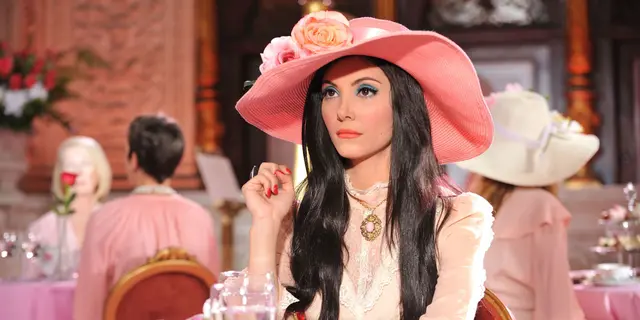Whatdomen want? According to Elaine, the raven-haired vixen at the center of Anna Biller'sThe Love Witch, the answer to the proverbial question is simple: "Just a pretty woman to love." Elaine firmly believes that it's a woman's job to make men feel like men: to stroke their egos, cook their steak just so, to cater to their every desire both in and out of the bedroom. In short: a woman should exist as a fantasy and have the fetish underwear to match.
With her thickly lined lids and enviable collection of mini mod dresses, Elaine certainly looks like a manmade celluloid dream circa 1969, but that's what makes her the perfect vehicle to stir up a little gender trouble in Biller's contemporary-minded feminist manifesto.
"It could be confusing for men, because I'm giving them very visual sexual fantasies," Biller chuckles over the phone from her home in LA, when asked whether the message of her film ever gets misconstrued. "Sometimes when they get [that] their minds just don't work that well."
Oscilloscope Laboratories
Played by a pitch-perfect Samantha Robinson, Elaine is more than just a pretty face and an amazing pair of legs. She also happens to be a witch—as in, a devotee of the Wiccan faith—with a penchant for love potions. She seduces men easily and freely, even if they happen to be married or otherwise engaged. But for all her irresistible good looks, she's unlucky in love—and love is the one thing she truly desires.
In a series of flashbacks, we learn that Elaine's husband left her back when she was some pounds heavier and apparently a little messy around the house. ("Do you know that the other day I actually found a hot dog behind the couch?" he chides.) Her revenge? She kills "poor Jerry" for treating her badly and for breaking her heart.
It becomes clear within just a few scenes of the film that Biller is not only up on her feminist political theory, but she's also a huge cinephile with a well-stocked library of visual references to draw from. Over the course of our conversation she mentions Alfred Hitchcock, Douglas Sirk, Carl Dreyer, and Rainer Werner Fassbinder. For the record, master of exploitation flicks Russ Meyer is not on her list of influences, despite the constant comparisons from audiences and journalists alike. "The misunderstanding comes from the idea that [The Love Witch] is a parody of films that objectify women and that it's celebrating those films," she explains. "Rather than people understanding it as a film in which a woman is making a film about a woman whohas been
With its hand-crafted gore and deadpan, breathy dialogue,The Love Witchcertainly relies on pastiche and high camp to create an entirely unique cinematic vision—one that's as seductive as it is uproariously funny—but there's also a throughline of tragedy.The Love Witchisn't so much a movie about a "crazy" man-hating woman as it is about the daily realities of simply being a woman.
Biller is not only the writer and director of the the film—she's also credited as the editor, producer, composer, production designer, and costume designer. Her meticulous attention to detail can be felt in every element of every frame—from the floral china teacups that decorate the opulent tea-room where Elaine lunches to the "rather garish" interior of her apartment, which is laden with purple velvet drapes. Every set was either built or completely transformed by Biller herself, every costume (and there aremany) hand-sewn in her apartment.
"The design is married to the script," Biller says. "If the film opens on Samantha driving a red convertible mustang, then she's got to be wearing a red dress. And she has to have red luggage, and a red handbag, and red shoes. That's the kind of person she is. She's styling herself like a Barbie doll and she's going to give herself the accessories to match."
If sex is Elaine's primary source of power, it's also her albatross. She might be able to smile her way out of a speeding ticket, but she's also constantly being leered at, cat-called, used, and abused—whether emotionally by her ex-husband, or physically by the Wiccan high priest who "ceremonially" gropes and kisses her like its his God-given right to do so. Things don't end so well for our heroine, even if she's the last one standing—jeweled dagger in hand—when the final credits roll.
For all the laughs and hyper-saturated visual pleasure it provides,The Love Witchalso feels urgent, particularly in light ofthis election cycle, and the director has noticed a shift in critical response towards the more serious undertones of her work since the results came in. Her perception hasn't changed, though: "I had those tragic elements in there all along."
(ELLE)
 简体中文
简体中文

